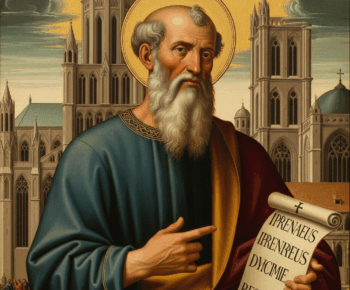
📖 A Bridge to the Apostles
Saint Irenaeus (c. 130–202 AD) was one of the earliest and most important Christian theologians of the post-apostolic era. Born in Smyrna (modern-day Turkey), he was a student of Polycarp, who in turn had been a disciple of the Apostle John. This direct connection made Irenaeus a powerful link between the first generation of apostles and the growing Church of the second century.
“What we have heard from the elders, we proclaim to you.” – Irenaeus
✈️ Missionary and Bishop of Lyons
Around the middle of the 2nd century, Irenaeus traveled west to Gaul (modern-day France), settling in Lyons. There, he served as a priest under Bishop Pothinus. During a time of violent persecution by Roman authorities, Pothinus was martyred, and Irenaeus was appointed his successor.
As Bishop of Lyons, Irenaeus became a shepherd to a diverse and persecuted Christian community. He played a vital role in unifying doctrine and preserving apostolic teaching in a time of growing confusion and false teachings.
⚔️ Defender Against Heresy
Irenaeus is most famous for his five-volume work, Against Heresies (Adversus Haereses), written around 180 AD. In this landmark text, he passionately refuted the teachings of Gnosticism, a widespread heresy that denied the goodness of the material world and distorted the nature of Christ.
Gnostics taught that secret knowledge (gnosis) was the path to salvation. Irenaeus countered with a clear, powerful affirmation of the public teaching of the apostles, the goodness of creation, and the unity of Scripture.
🗣️ “Error, indeed, is never set forth in its naked deformity… it is disguised by attractive finery.” – Irenaeus, Against Heresies
🧱 Champion of Apostolic Tradition
Irenaeus emphasized that the truth of Christianity could be traced through the succession of bishops—especially the bishops of Rome—back to the apostles themselves. This made him one of the first theologians to articulate the idea of apostolic succession, a concept still central to Catholic and Orthodox ecclesiology today.
His writings also include one of the earliest complete outlines of Christian doctrine, including the divinity of Christ, the Trinity, and the real presence in the Eucharist.
🕯️ Death and Legacy
The exact date and manner of Irenaeus’s death are unclear, but tradition holds that he died around 202 AD, possibly as a martyr during Emperor Septimius Severus’s persecution.
In 2022, Pope Francis formally declared Irenaeus a Doctor of the Church, recognizing him as a “Doctor of Unity” for his efforts to unify the Church in both doctrine and love.
🏛️ Why Irenaeus Still Matters
Saint Irenaeus remains one of the most influential early Christian thinkers. His insistence on the unity of Scripture, the authority of apostolic tradition, and the goodness of creation helped shape orthodox Christian theology for centuries to come.
In a world still wrestling with division and distortion, his life and writings offer clarity, balance, and hope.
💬 “The glory of God is man fully alive, and the life of man is the vision of God.” – Saint Irenaeus